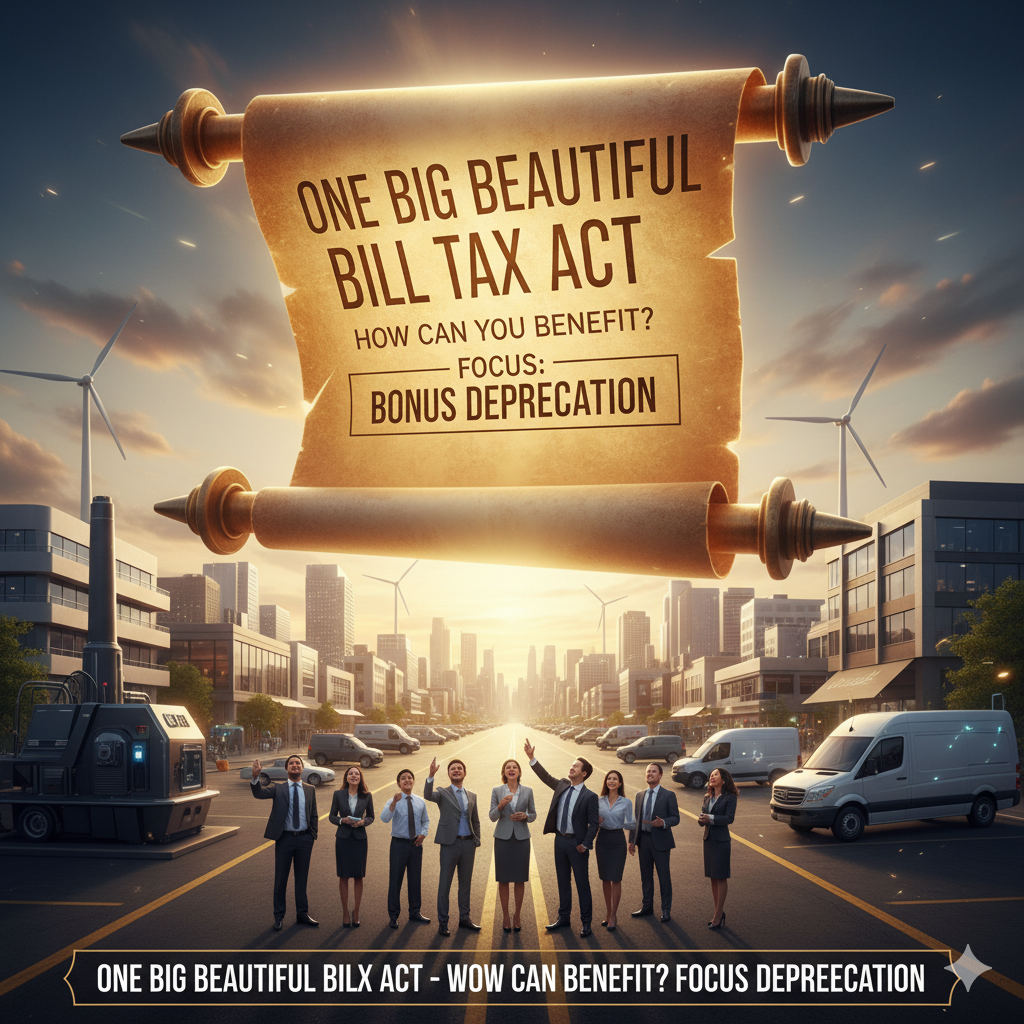One Big Beautiful Bill Tax Act – How Can You Benefit?
Focus: Bonus Depreciation
On July 4, 2025 President Donald J. Trump signed into law H.R.1 – One Big Beautiful Bill Act (“OBBBA”). The OBBBA contains hundreds of provisions including permanently extending the individual tax rates Trump signed into law in 2017, which were originally set to expire at the end of 2025.
Prior law
Before the One Big Beautiful Bill Act (OBBBA), bonus depreciation was in a phasedown period initiated by the Tax Cuts and Jobs Act (TCJA) of 2017.
The TCJA had temporarily allowed businesses to deduct 100% of the cost of eligible property, but this was designed to decline in the years that followed.
The bonus depreciation rates in effect prior to the OBBBA were:
- 2022: 100%
- 2023: 80%
- 2024: 60%
- January 1–19, 2025: 40%
New law
The OBBBA permanently reinstated 100% bonus depreciation for most qualified property acquired after January 19, 2025 and reversed the prior scheduled phaseout. This includes tangible property with a class life of 20 years or less, consistent with prior bonus depreciation rules.
Property acquisitions for which a written binding contract was entered into before January 20, 2025, is treated as acquired on written binding contract date, which may cause otherwise eligible property to not be eligible for the expanded 100% bonus depreciation.
Also, the OBBBA introduces a new, temporary full expensing provision for “qualified production property”—a category of building property typically excluded from bonus depreciation due to its 39-year class life. To qualify, the property must meet all the following criteria:
- Used by the taxpayer as an integral part of a qualified production activity
- Placed in service in the United States, or any possession of the United States
- Its original use commenced with the taxpayer
- Construction began after January 19, 2025, and before January 1, 2029
- Designated by election
- Placed in service before January 1, 2031
The return of 100% bonus depreciation means that capital investments—whether in machinery, equipment, or qualifying facilities—can be deducted in full in the year they are placed in service.
The new provision for qualified production property is important for manufacturers, refiners, and producers. It allows them to fully expense the cost of constructing or acquiring production facilities—an option that was previously unavailable.
But Beware …
Leased property does not qualify, and portions of buildings used for nonproduction purposes (e.g., offices, research and development, sales) are excluded. A special rule allows certain used property to qualify if it hasn’t been used in a production activity since January 1, 2021.
Therefore, businesses must carefully assess whether their property qualifies, especially when it comes to mixed-use buildings or repurposed facilities. The 10-year recapture rule also means that if the property ceases to be used in a qualified production activity, some of the tax benefits may be clawed back.
What Should You Do?
You know that at the Law Offices Of Jeffrey B. Kahn, P.C. we are always thinking of ways that our clients can save on taxes. If you are selected for an audit, stand up to the IRS by getting representation. Tax problems are usually a serious matter and must be handled appropriately so it’s important to that you’ve hired the best lawyer for your particular situation. The OBBBA’s restoration of 100% bonus depreciation and its expansion to certain building property represent a powerful incentive for businesses to invest in production assets. With careful planning and strategic execution, businesses can turn this tax change into a competitive advantage. The tax attorneys at the Law Offices Of Jeffrey B. Kahn, P.C. located in Orange County (Irvine), Los Angeles, San Francisco Bay Area (including San Jose and Walnut Creek) and elsewhere in California are highly skilled in handling tax matters and can effectively represent at all levels with the IRS and State Tax Agencies including criminal tax investigations and attempted prosecutions, undisclosed foreign bank accounts and other foreign assets, and unreported foreign income. Also if you are involved in cannabis, check out what a cannabis tax attorney can do for you. And if you are involved in crypto currency, check out what a bitcoin tax attorney can do for you.


 Follow
Follow Follow
Follow
